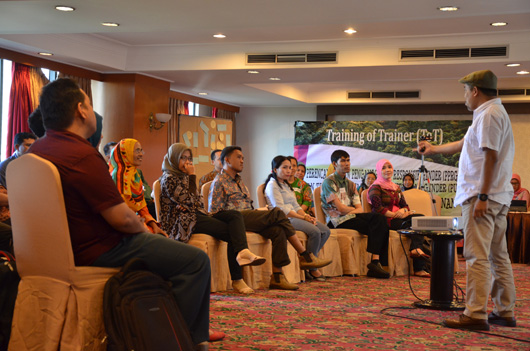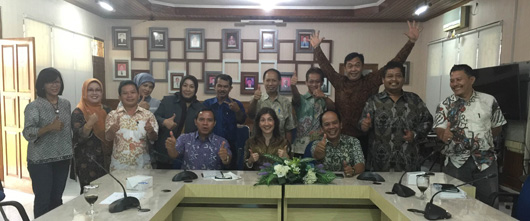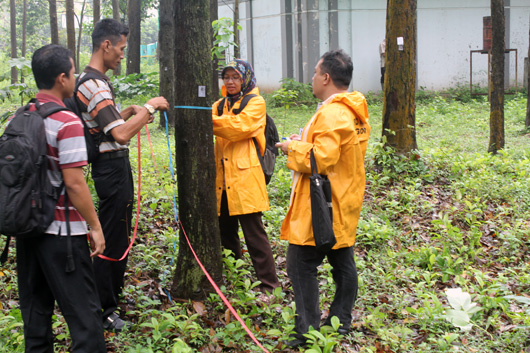FORCLIME
Forests and Climate Change ProgrammeTechnical Cooperation (TC Module)

Select your language

With the aim of increasing and strengthening human resource capacities within the Ministry of Environment and Forestry (MoEF), the Working Group (WG) of Gender Mainstreaming of the MoEF and FORCLIME conducted aTraining of Trainers (ToT) on gender responsive planning, budgeting and facilitation. Participants of the training, which took place from 23-26 February 2016 in Jakarta, were focal points from Gender Mainstreaming WG, the MoEF Province Models (East Nusa Tenggara and West Sumatra), FORCLIME Demonstration Activities and the District Program Management Unit of FORCLIME Financial Cooperation.
On the first day, participants learned about the concept of gender equality and experiences from province models. Steps on gender responsive planning and budgeting were presented during the second day, along with group exercises. On day three, the participants were received an introduction to moderation and facilitation techniques for gender issues, and final day consisted of training on micro-teaching and futher group work.
The ToT was conducted succesfully. Afterwards, many participants expressed their expectation to have more such training to increase the number of skilled facilitators for gender issues.
For further information please contact:
Mohamad Rayan, FORCLIME Gender Officer

Anne-Cathrin Vonarx, FORCLIME’s development advisor for e-learning development, presented the achievements of her work to officials from the Training Center for Human Resources, Ministry of Environment and Forestry on February 19, 2016. For almost two years, from April 2014 until February 2016, Ms. Vonarx had been assigned as a development adviser with FORCLIME to support the Strategic Area on Human Capacity Development. She was posted at the Center for Forestry Education and Training (CFET) in Bogor.
During her final presentation, Ms. Vonarx highlighted the improvements of the e-learning development process that had been achieved through the collaboration between FORCLIME and CFET. These include:
(1) Institutional development of e-learning including strengthening the e-learning team at CFET;
(2) Strengthening capacity of management staff and lecturers in the development of e-learning;
(3) Development of training modules for blended learning, a combination of e-learning and face-to-face training;
(4) Development of networks for e-learning, for example with the Indonesian Chamber of Commerce,the Geology Training Center of the Ministry of Energy and Mineral Resources, and the Training Center ofthe Financial and Development Supervisory Agency.
During his speech, the Head of the Ministry’s Human Resource Training Center expressed his gratitude for the contribution of Ms. Vonarx, and promised to continue the jointly developed e-learning process.
For further information, please contact:
Edy Marbyanto, Strategic Area Manager for Human Capacity Development

The Ministry of Environment and Forestry (MoEF) through the Center for Education and Training for Human Resources and the Forestry Training Centre (CFET) and FORCLIME conducted a training on climate change and REDD+ for forest ecosystem management officials (PEH) in Bogor. Following this training, participants will be able to develop mitigation and adaptation action plans for climate change and REDD+ at their respective workplace.
The training is part of a pilot for blended learning development, a combination of training methods through online (e-learning) and direct teaching (face-to-face). The online sessions, an equivalent of 16 hours, were held from 1-12 February and followed by 37 participants from various forestry agencies in the area. The offline teaching sessions, held from February 16 to 19 with an equivalent of 26 hours, were attended by 18 participants from several Forest Management Units (FMUs) such as FMU West Berau and FMU Kapuas Hulu, by the Natural Resources Conservation Agency (BKSDA) in West Java as well as several national park authorities (Betung Kerihun - West Kalimantan, Lore Lindu - Central Sulawesi, Ujung Kulon - Banten, Gede Pangrango - West Java, Halimun Salak – West Java, Kepulauan Seribu - Jakarta). Participants who followed the offline sessions had been selected during online sessions. Only active and qualified participants during the online sessions were nominated to join the classroom sessions. The two topics presented during the face-to-face sessions include: (1) Monitoring, Reporting, Verification (MRV) in REDD+ and carbon accounting; and (2) Development of action plans. Both e-learning and face-to-face training sessions were facilitated by experienced trainers (widyaiswara) from CFET in Bogor.
A forest ecosystem management official (PEH) is a civil servant that has the task, responsibility, and authority to manage forest ecosystems for government agencies at both national and local levels. The key tasks of PEHs include preparing, implementing, developing, monitoring, evaluating and reporting on the activities of forest ecosystem management. Forest ecosystem management includes every effort related to methods, procedures, strategies and techniques in forest planning, forest area designation, forest utilization, forest and land rehabilitations, watershed management, and conservation of forest resources for effective and efficient sustainable forest management.
For further information, please contact:
Edy Marbyanto, Strategic Area Manager Human Capacity Development
 |
Supported By: |
  |